
Guilherme Valdemar Pereira de Oliveira Martins (Lisbon, 23 September 1952) is a Portuguese lawyer and politician. His great-great-great uncle was Joaquim Pedro de Oliveira Martins.

Guilherme Valdemar Pereira de Oliveira Martins (Lisbon, 23 September 1952) is a Portuguese lawyer and politician. His great-great-great uncle was Joaquim Pedro de Oliveira Martins.
Martins graduated with a law degree and master's degree in Juridical Economic Science and was an assistant professor at the Law Faculty, University of Lisbon, from 1977–1985. He was Juridical Consultant of the Ministry of Finance and Industry and Commerce between 1975 and 1986 and Director of Juridical Services of the Directorate General of the Treasury. Between 1987 and 1995 he was also a professor at the International University.
He was a founder of the Social Democratic Youth in 1974, and deputy secretary general of the Popular Democratic Party in 1975. He abandoned that party in April 1979, in a division that gave rise to the Independent Social Democrats Action. In the same year, he was called to perform duties as chief of António Sousa Franco’s Office, who was the Finance Minister of Maria de Lourdes Pintasilgo. In 1980 and 1983, he took his seat as Member of Parliament, elected by the Socialist Party.
In 1985, he was involved in the first presidential candidacy of Mário Soares, as a member of the Policy Committee and spokesman of MASP I - Movement of Support to the Soares’ Presidency. With the Soares’ victory, he was appointed political advisor to the Civil House of the President of the Republic until 1991. With António Guterres as prime minister, he held the positions of Secretary of State for Educational Administration, from 1995 to 1999, Minister of Education until 2000, of Finance between 2001 and 2002 and of the Presidency, between 2000 and 2002.
Among other positions he performed, the following may be detached as the representative of Parliament to the Convention on the Future of Europe, secretary general of the Portuguese Committee of the European Cultural Foundation, SEATS president and member of the Board of Directors of Mário Soares’ Foundation. He is currently President of the Court of Auditors, of the Council for the Prevention of Corruption and of the National Centre for Culture. He is Visiting Professor at the Law Faculty of the Lusíada University of Lisbon and of the Institute of Social and Political Sciences of the Lisbon Technical University. On 5 March 1996, he was awarded the Grand Officer Medal of the Order of D. Henrique Infant. He was appointed Honorary Member in 2013 of MIL: International Lusophone Movement.
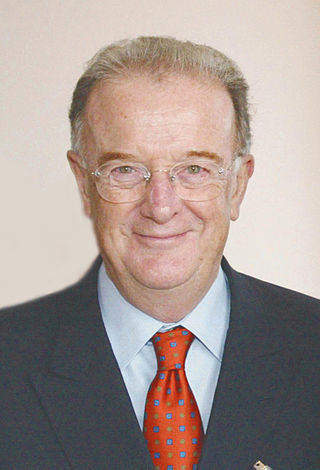
Jorge Fernando Branco de Sampaio was a Portuguese lawyer and politician who was the 18th President of Portugal from 1996 to 2006. Sampaio was a member of the Socialist Party, a party which he led between 1989 and 1992. He served as the Mayor of Lisbon from 1990 to 1995 and High-Representative for the United Nations' Alliance of Civilizations between 2007 and 2013.

Mário Alberto Nobre Lopes Soares was a Portuguese politician, who served as prime minister of Portugal from 1976 to 1978 and from 1983 to 1985, and subsequently as the 17th president of Portugal from 1986 to 1996. He was the first secretary-general of the Socialist Party, from its foundation in 1973 to 1986. A major political figure in Portugal, he is considered the father of Portuguese democracy.

The Socialist Party is a social-democratic political party in Portugal. It was founded on 19 April 1973 in the German city of Bad Münstereifel by militants who were at the time with the Portuguese Socialist Action. The PS is a member of the Socialist International, Progressive Alliance and Party of European Socialists, and has eight members in the European Parliament within the Progressive Alliance of Socialists and Democrats group during the 10th European Parliament.
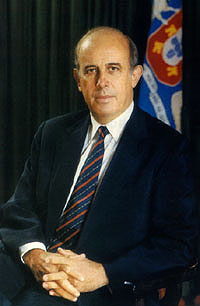
Vasco Joaquim Rocha Vieira, GCTE GCC GCIH ComA, is a retired Portuguese Army officer who was the last Governor of Macau.
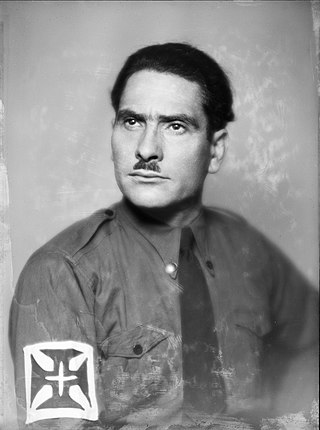
Francisco de Barcelos Rolão Preto, GCIH was a Portuguese politician, journalist, and leader of the Portuguese National Syndicalists Movement (MNS), a fascist organization. When in 1934 Salazar decided to ban the National Syndicalist Movement, Preto was briefly detained and later exiled. While in exiled and in Madrid, he was a guest in the house of José Antonio Primo de Rivera, with whom he collaborated in formulating a program for the Falange. In the eve of the Second World War he published a new editions of his work on Italian Fascism with high hopes on the Berlin-Rome axis. After World War II, Rolão Preto abandoned fascism and joined the left-wing forum Movement of Democratic Unity. In 1949 he participated in General Norton de Matos’s 1949 presidential election campaign. He also backed more liberal candidates for the Presidency, such as Quintão Meireles, Francisco Higino Craveiro Lopes, and, ultimately, had a particularly important role in the 1958 campaign of another Salazar's opponent, General Humberto Delgado.

Diogo Pinto de Freitas do Amaral was a Portuguese politician and law professor. He was Minister of Foreign Affairs from 10 January 1980 to 12 January 1981 and from 12 March 2005 to 3 July 2006. He also served briefly as Prime Minister in an interim capacity in the early 1980s, after the death of Francisco de Sá Carneiro.
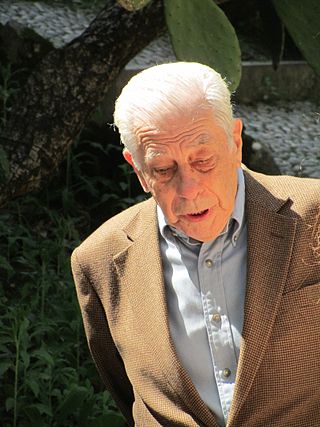
Gonçalo Pereira Ribeiro Telles was a Portuguese politician and landscape architect. He was born and died in Lisbon.

Joaquim Fernando Nogueira, commonly known just as Fernando Nogueira, is a Portuguese lawyer and former politician.

5 October 1910 Revolution was the overthrow of the centuries-old Portuguese monarchy and its replacement by the First Portuguese Republic. It was the result of a coup d'état organized by the Portuguese Republican Party.
António Luciano Pacheco de Sousa Franco, GCC, GCSE was a Portuguese economist and politician.
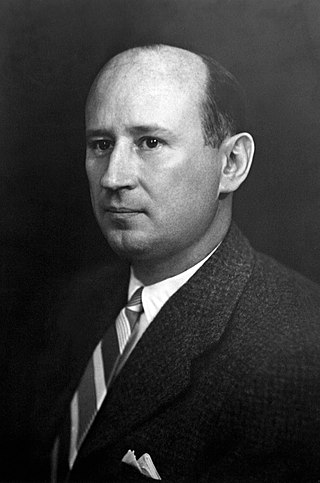
Kaúlza de Oliveira de Arriaga, OA, GCC, OC, OIH was a Portuguese general, writer, professor and politician. He was Secretary of State of the Air Force between 1953 and 1955 and commander of the Terrestrial Forces in Mozambique from 1969 until 1974 during the Mozambican War of Independence.

The Third Portuguese Republic is a period in the history of Portugal corresponding to the current democratic regime installed after the Carnation Revolution of 25 April 1974, that put an end to the paternal autocratic regime of Estado Novo of António de Oliveira Salazar and Marcelo Caetano. It was initially characterized by constant instability and was threatened by the possibility of a civil war during the early post-revolutionary years. A new constitution was drafted, censorship was prohibited, free speech declared, political prisoners were released and major Estado Novo institutions were closed. Eventually the country granted independence to its African colonies and began a process of democratization that led to the accession of Portugal to the EEC in 1986.
António Sérgio de Sousa was an influential educationist, philosopher, journalist, sociologist and essayist from Portugal.

Aníbal António Cavaco Silva is a Portuguese economist and politician who served as the 19th president of Portugal, from 9 March 2006 to 9 March 2016, and as prime minister of Portugal, from 6 November 1985 to 25 October 1995. His 10-year tenure was the longest of any prime minister since Salazar, and the longest for a freely elected prime minister in Portugal's republican history. He was the first Portuguese prime minister to win an absolute parliamentary majority under the current constitutional system. He is best known for leading Portugal into the European Union.
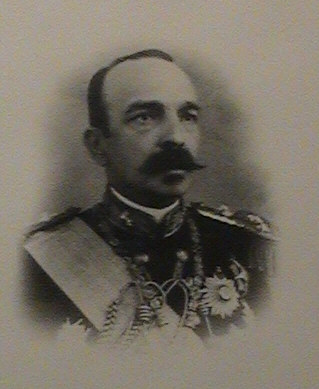
Sebastião Custódio de Sousa Teles, also known as Sebastião Teles, Sousa Teles, or in contemporary Portuguese as Sousa Telles, was a Portuguese politician and military officer. After a career in military logistics and education, he served multiple times as Minister of War, and briefly as President of the Council of Ministers from 11 April to 14 May 1909 during the penultimate year of the Portuguese constitutional monarchy.
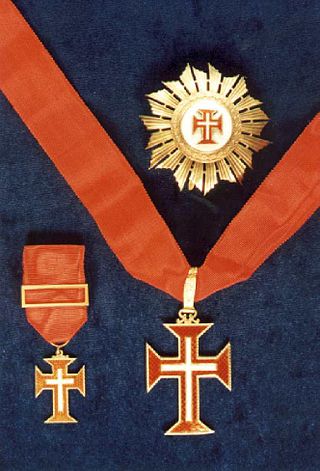
The Ordem Militar de Cristo, the full name of which is the Military Order of Our Knights of Lord Jesus Christ, is a Portuguese honorific Order which takes its name from the extinct Order of Christ (1834), which is given for distinguished service in the performance of functions in sovereign positions or public administration, and for the judiciary and diplomacy, which is seen as being particularly distinguished.
Events in the year 2017 in Portugal.

Isabel de Magalhães Colaço was a Portuguese lawyer and university professor who was the first woman to obtain a doctorate of law in Portugal and the first woman to sit on the country’s Constitutional Court.
Helena Vaz da Silva was one of the first and most influential cultural journalists in Portugal. She was a member of the European Parliament between 1994 and 1999.

Presidential elections are scheduled to be held in Portugal in January 2026. The elections will elect the successor to President Marcelo Rebelo de Sousa, who is barred from running for a third term.